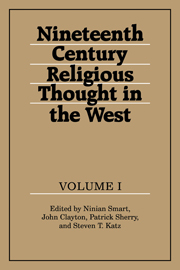2 - J. G. FICHTE AND F. W. J. SCHELLING
Published online by Cambridge University Press: 05 August 2016
Summary
The public controversy concerning Fichte's religious outlook and his condemnation as an atheist make the connection between him and Schelling doubly interesting. It is as interesting to see the tension between idealist philosophy and theology in both as the seedbed of modern atheism as it is to see in Schelling's development of Fichte's philosophy of religion the decisive formulation of those insights which idealism was to contribute to modern theology. Also interesting is the question of the relation between this emergent idealism and the philosophy of Kant whose spectre haunts all modern philosophy and theology. If it is in Fichte that one sees the obvious effect of the importance Kant gave to morality there is also a clear connection between Schelling's metaphysics of freedom and Kant's intuition that in dealing with the problem of freedom one was approaching the heart of the matter in metaphysics. In his masterly survey of post-Kantian idealist systems Frederick Copleston has aptly characterized them as not only continuing Kant's understanding of a possible metaphysic but inflating his theory of knowledge into a metaphysics of reality. It will be particularly important for us in this context to see how this metaphysics accommodated religion; for, as we have said, one of the reasons why both Fichte (1762–1814) and Schelling (1775–1854) are interesting to the modern historian of religious thought is that each is so far from being a crypto-theologian that his thought can be interpreted as posing the question of what sense can be given to the fundamental ideas of Christianity, God, creation, revelation and redemption.
- Type
- Chapter
- Information
- Nineteenth-Century Religious Thought in the West , pp. 41 - 80Publisher: Cambridge University PressPrint publication year: 1985
- 1
- Cited by



